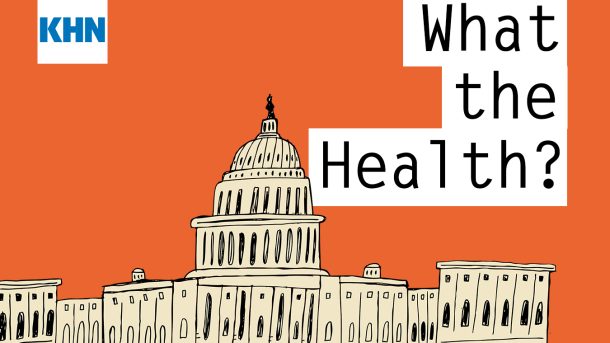The Host
Julie Rovner
KHN
Read Julie’s stories.
Julie Rovner is chief Washington correspondent and host of KHN’s weekly health policy news podcast, “What the Health?” A noted expert on health policy issues, Julie is the author of the critically praised reference book “Health Care Politics and Policy A to Z,” now in its third edition.
Health care was a recurring theme throughout President Joe Biden’s 2023 State of the Union address on Capitol Hill this week. He took a victory lap on recent accomplishments like capping prescription drug costs for seniors on Medicare. He urged Congress to do more, including making permanent the boosted insurance premium subsidies added to the Affordable Care Act during the pandemic. And he sparred with Republicans in the audience — who jeered and called him a liar — over GOP proposals that would cut Medicare and Social Security.
Meanwhile, abortion rights advocates and opponents are anxiously awaiting a federal court decision out of Texas that could result in a nationwide ban on mifepristone, one of two drugs used in medication abortion.
This week’s panelists are Julie Rovner of KHN, Alice Miranda Ollstein of Politico, Rachel Cohrs of Stat, and Sarah Karlin-Smith of the Pink Sheet.
Panelists
Rachel Cohrs
Stat News
Sarah Karlin-Smith
Pink Sheet
Alice Miranda Ollstein
Politico
Among the takeaways from this week’s episode:
- President Joe Biden’s State of the Union address emphasized recent victories against high health care costs, like Medicare coverage caps on insulin and out-of-pocket caps on prescription drug spending. Biden’s lively, informal exchange with lawmakers over potential cuts to Medicare and Social Security seemed to steal the show, though the political fight over cutting costs in those entitlement programs is rooted in a key question: What constitutes a “cut”?
- Biden’s calls for bipartisanship to extend health programs like pandemic-era subsidies for Affordable Care Act health plans are expected to clash with conservative demands to slash federal government spending. And last year’s Senate fights demonstrate that sometimes the opposition comes from within the Democratic Party.
- While some abortion advocates praised Biden for vowing to veto a federal abortion ban, others felt he did not talk enough about the looming challenges to abortion access in the courts. A decision is expected soon in a Texas court case challenging the future use of mifepristone. The Trump-appointed judge’s decision could ban the drug nationwide, meaning it would be barred even in states where abortion continues to be legal.
- The FDA is at the center of the abortion pill case, which challenges its approval of the drug decades ago and could set a precedent for legal challenges to the approval of other drugs. In other FDA news, the agency recently changed policy to allow gay men to donate blood; announced new food safety leadership in response to the baby formula crisis; and kicked back to Congress a question of how to regulate CBD, or cannabidiol, products.
- In drug pricing, the top-selling pharmaceutical, Humira, will soon reach the end of its patent, which will offer a telling look at how competition influences the price of biosimilars — and the problems that remain for lawmakers to resolve.
Also this week, Rovner interviews Kate Baicker of the University of Chicago about a new paper providing a possible middle ground in the effort to establish universal health insurance coverage in the U.S.
Plus, for “extra credit,” the panelists suggest health policy stories they read this week they think you should read, too:
Julie Rovner: The New York Times’ “Don’t Let Republican ‘Judge Shoppers’ Thwart the Will of Voters,” by Stephen I. Vladeck
Alice Miranda Ollstein: Politico’s “Mpox Is Simmering South of the Border, Threatening a Resurgence,” by Carmen Paun
Sarah Karlin-Smith: KHN’s “Decisions by CVS and Optum Panicked Thousands of Their Sickest Patients,” by Arthur Allen
Rachel Cohrs: ProPublica’s “UnitedHealthcare Tried to Deny Coverage to a Chronically Ill Patient. He Fought Back, Exposing the Insurer’s Inner Workings,” by David Armstrong, Patrick Rucker, and Maya Miller
Also mentioned in this week’s podcast:
Credits
Francis Ying
Audio producer
Emmarie Huetteman
Editor
To hear all our podcasts, click here.
And subscribe to KHN’s What the Health? on Spotify, Apple Podcasts, Stitcher, Pocket Casts, or wherever you listen to podcasts.
KHN (Kaiser Health News) is a national newsroom that produces in-depth journalism about health issues. Together with Policy Analysis and Polling, KHN is one of the three major operating programs at KFF (Kaiser Family Foundation). KFF is an endowed nonprofit organization providing information on health issues to the nation.
USE OUR CONTENT
This story can be republished for free (details).
We encourage organizations to republish our content, free of charge. Here’s what we ask:
You must credit us as the original publisher, with a hyperlink to our khn.org site. If possible, please include the original author(s) and “Kaiser Health News” in the byline. Please preserve the hyperlinks in the story.
It’s important to note, not everything on khn.org is available for republishing. If a story is labeled “All Rights Reserved,” we cannot grant permission to republish that item.
Have questions? Let us know at KHNHelp@kff.org







